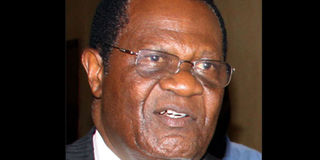Judges to earn above Shs25m

Whereas Chief Justice Benjamin Odoki has always made a case for increase of judicial officers’ pay, he will not benefit from the new scheme since he has recently retired. His successor will earn Shs40m a month. FILE PHOTO
What you need to know:
Leap. Justice minister Kahinda Otafiire asks Parliament to approve proposal that will see judicial officers’ monthly pay increased by over 600 per cent
Judges salary in region
Designation --------------- Kenya ----------- Zambia ------------- Uganda
Chief Justice ------------ Shs26m ----------- Shs9.8m ----------- Shs5.9m
Deputy CJ ---------------- Shs25m ----------- Shs8.8m ----------- Shs5.8m
Appellate Judges --------- Shs16m ----------- Shs7.9m ----------- Shs5m
Principal Judge ---------- Shs16m ----------- Shs7.9m ----------- Shs5.09m
Justices of H.Court ------ Shs14m ----------- Shs7m ------------- Shs4.8m
If a new salary offer by Justice Ministry gets the parliamentary nod, the monthly pay for the Chief Justice, his deputy and other senior judicial officers on the bench, will raise by 600 per cent with effect from July.
The 2013/14 salary structure presented by the Justice Minister, Gen Kahinda Otafiire, shows that the monthly pay for the new Chief Justice (yet to be appointed) will be increased from about Shs5.8 million to Shs40 million and the deputy will earn Shs34.9 million up from Shs5.3 million.
The Principal Judge, who now earns about Shs5m per month, will get Shs32.2 million next July.
Supreme Court Justices, who currently earn Shs4.9million, will receive Shs29.6m and the Judges at the Court of Appeal will be paid Shs28.1m up from Shs4.7million.
High Court Justices, who earn Shs4.5m, will get Shs26million.
MPs on the Legal and Parliamentary Affairs committee said better pay for judicial officers is expected to translate into higher motivation and also higher propensity to resist corruption.
It also means the bench can attract the best lawyers from the more lucrative private legal practice.
Whereas it is not clear if Parliament will adopt the proposal, Finance Minister Maria Kiwanuka announced last week that on account of lack of funds, the government had failed to find Shs365 billion needed to increase salaries for teachers, health workers, UPDF and other lower cadre civil servants.
However, some MPs led by Abdul Katuntu (Bugweri) rejected the “outrageous” salary increase for non-judicial officers such as drivers, askari, typists, office supervisors, data entry clerks among others who are expected earn more than Shs5m per month up from about Shs200,000.
Budget increase Gen Otafiire, who was presenting his budget requirements for the next financial year, told MPs that the new salary enhancement will require an additional Shs158 billion, which translated into two per cent of the total national budget for 2013/14 Financial Year.
“We have part of the money but we are still discussing with Ministry of Finance to ensure that we get all the funds needed to enhance salaries for judges and other lowercadre employees,” Gen. Otafiire said.
To justify the proposed salary increase for the judges, the Judiciary accounting officer, Ms Dorcus Okalany, told the committee that they are responding to “insinuations” that the judicial officers cannot withstand “the temptations of rich defendants before them because of poor terms and conditions of service.”
“There is need for judges to be remunerated appropriately so that they are not perceived as being weak and willing to take the bidding of the rich,” Ms Okalany said.
She said research done within the East and Central Africa region indicates that judicial officers in Uganda continue to enjoy the least terms and conditions of service compared to their counterparts in the region.
The government in 2006 increased the basic monthly salary of the Chief Justice from Shs3.3 million to Shs5.8 million and that of the Deputy Chief Justice (DCJ) from Shs3 million to Shs5.3 million. The Principal Judge’s salary was also increased from Shs2.7 million to Shs5 million.
The Supreme Court justic’’s salary was raised from Shs2.8 million to Shs4.9 million, while the Court of Appeal justice’s salary was increased from Shs2.6 million to Shs4.7 million.
Cries foul
Retiring Chief Justice, Benjamin Odoki has on several occasions publicly complained about “pocketsised” pay for judicial officers. Justice Odoki at a judges’ conference in January said judicial officers were underpaid.
The chief justice also lamented the delay to appoint judges to fill vacancies on the bench, a glitch that has acerbated the case backlog in the country, currently standing at 392,111 cases as of December 2012.
Gen Otafiire told MPs after he was kicked out of the committee on Tuesday over shortage of judges that he “got in touch with” State House and they assured him that the list of new judges had been sent to Speaker Rebecca Kadaga.
However, Saturday Monitor could not verify Gen Otafiire’s claim since sources close to Speaker’s Office said they had not received the list. Last year, Gen Otafiire assured the committee that the President had sent a list of members of the Judicial Service Commission to the Speaker but it took six months for the list to reach Parliament.
Gen. Otafiire told MPs that the new in the list, the number of Supreme Court judges were increased from seven to 11, Court of Appeal from eight to 15 and High Court from 50 to 82.
He said the government was phasing out Grade II Magistrates as part of the wider efforts to ensure efficiency and delivery of justice in a speedy manner.
Chief Magistrates were increased from 39 to 120 and magistrates from 128 to 500.



